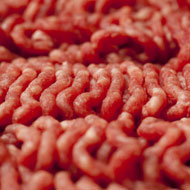
72 per cent of consumers want information on stunning animals
The BVA are calling on the European Commission to back proposals to introduce labelling of non-stun slaughtered meat.
The call follows an EU-wide study which revealed that over 70 per cent of consumers want information on stunning animals when buying meat.
The survey was commissioned in July 2011 to assess the public's appetite for labelling after European parliament proposals to include labelling of non-stun slaughtered meat were withdrawn in order to achieve consensus.
BVA president John Blackwell said: "This EU-wide report confirms that consumers are interested in the provenance of their meat and meat products with a clear majority (72 per cent) saying they are interested in receiving information about the stunning of animals.
"The long-awaited release of this report gives renewed vigour to the BVA's campaign for better consumer information on animal welfare at slaughter and the need for meat from non-stun slaughter to be clearly labelled."
Despite consumers wanting more information, the survey found that animal welfare is not a priority issue. It also found that information on pre-stunning is only of interest when the issue is brought to the attention of consumers.
Responding to these findings, Mr Blackwell added: “As the report states, EU consumers already expect certain standards to be adhered to. That means that there is already a high expectation that European standards on animal welfare will be applied to all products.
“Non-stun slaughter is only permitted through a derogation from EU-wide legislation so consumers expect their meat has been killed in accordance with the law, which clearly states that all animals should be stunned prior to slaughter to ensure their welfare is not compromised. That is why BVA remains absolutely clear that better and clearer consumer information is essential. Ultimately, transparency is vital to maintain confidence in the food chain.
“In addition, the recent Voice of the Veterinary Profession 2015 Spring survey showed that requiring all animals be stunned before slaughter, or improving welfare at slaughter was UK vets top priority for Government.”
To download the report, The Study on Information to Consumers on the Stunning of Animals released by the European Commission Directorate General for Health and Food Safety, visit: http://ec.europa.eu



 The Veterinary Medicines Directorate (VMD) is inviting applications from veterinary students to attend a one-week extramural studies (EMS) placement in July 2026.
The Veterinary Medicines Directorate (VMD) is inviting applications from veterinary students to attend a one-week extramural studies (EMS) placement in July 2026.